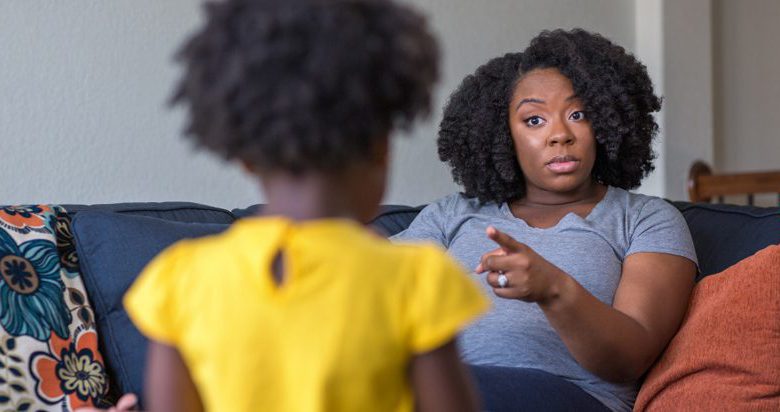Discipline by Age

Discipline by Age
Imagine your child reaches over and knocks a lamp off a side table, breaking it. As the parent, it’s time to dole out some discipline.
But let’s imagine your child is 11 months old. How does that change your approach? What if they’re 4? Do they get the same type of punishment as a baby? Probably not.
So what’s a parent to do when they’re trying to make the punishment fit the crime? We’re glad you asked.
Lessening Unwanted Behavior
Regardless of how old your child is when they knock over this metaphorical lamp, you still don’t want them tearing up your stuff. Discipline and correction can start being handed down as soon a child is pulling up and crawling, according to the University of Rochester Medical Center, and should be catered to the child. No one discipline tactic works for all situations.
Punishment has two forms:
- Denying privileges or activities. This is unique to each child and could range from having a toy taken away for an afternoon to not going to the park.
- Requiring an activity that isn’t fun, such as doing chores, or having a “time out.”
Try to make these consequences logical. For example, if your child gets into the cabinets and pulls out all of the canned goods, make them help you pick them up. If they throw a toy and it hits someone, keep the toy out of their reach for a set period of time.
Notice these “popular” techniques weren’t a part of that list:
- Giving positive support for bad behavior. In other words, don’t give a child a treat to keep them from throwing a tantrum. Instead, try ignoring them. If that doesn’t work, have the behavior result in an unpleasant result, i.e., punishment.
- Spanking and other forms of physical punishment. A lot of research has shown that this type of discipline is counterproductive in that it teaches children to handle situations with aggressive behavior.
Age-Appropriate Punishments
Babies (1 Year Old & Under)
Babies are mini explorers … who don’t understand how the world works, how to communicate or exercise impulse control. When they break an object or get into something they shouldn’t, they aren’t being bad — they’re being babies!
How to discipline:
- Keep your expectations reasonable. Remember, they are babies.
- Your tone of voice and facial expressions are excellent ways to communicate with your baby. Be firm, but don’t overreact.
- An ounce of prevention goes a long way. Childproof your home so the things you’ll be upset about getting broken are gone and the things that could be a danger to your child are no longer an issue.
- Handle meltdowns by comforting and distracting.
Toddlers (2-3 Years Old)
Here’s where the rubber meets the road. The emotional turmoil and newly found independence that come with being a toddler make discipline more necessary. Add to it a still-limited ability to communicate and impulse control that’s only slightly better, and you’re going to run into a lot more instances where punishing your child is necessary.
How to discipline:
- Accept that tantrums will happen. Plan ahead for what you’ll do when they occur.
- Using time outs wisely. Until kids are 3 years old, time outs aren’t really effective. Children need to be old enough to understand why they’re getting a time out for them to be helpful. To get the most bang for your buck:
- Sit them in a distraction-free area.
- Explain to them what they did wrong even if you think they know (they may not) and how to behave appropriately next time.
- Set a timer to 1 minute for every year of age. (In this case, 2-3 minutes tops.)
- After a time out, acknowledge when they behave correctly.
- Kids only start feeling empathy for others after they turn 2, so keep that in mind whenever they’re acting like little heathens (as our parents used to say). Teach them how to use his words (instead of their fists) to express their feelings.
Preschoolers (4-5 Years Old)
Preschoolers have a better handle on where the line is in terms of exercising their independence and controlling their impulse control. (Thank goodness.) Unfortunately, whining becomes a more regular thing, and this age group is the one that starts testing out lying and cheating.
How to discipline:
- Allow plenty of time for transitions.
- Ignore whining and refuse or agree to the request as you normally would.
- Handle lies and cheating calmly. Kids at this age don’t understand that this kind of behavior is wrong. You reacting harshly or angrily will only make them reluctant to confess in the future. Deal out discipline in the same manner that you would for any other kind of misbehavior.
- Use limits to work on self-control. Give them a time limit on how long they have to start behaving. Otherwise, you’ll start disciplining.
Parents Are the Best Role Models
Just like most things with kids, they are looking to mom or dad when it relates to behavior. They’re watching when you get mad, and they’re taking notes (even if it doesn’t feel like it). The more you reflect the kind of behavior you want to see in your household, the more your kids will do the same. Early childhood can feel like a slog as it relates to your kids’ behavior. But they really are watching, and the way you choose to discipline them will make a big impact on their futures.
For more about tantrums, discipline, positive parenting read:
- Why Do Kids Have Tantrums — And What Can Parents Do?
- It’s Happening: What To Do When Your Child Throws a Tantrum in Public
- Positive Discipline for Preschoolers and Toddlers
- Everything You Need to Know about Positive Parenting





